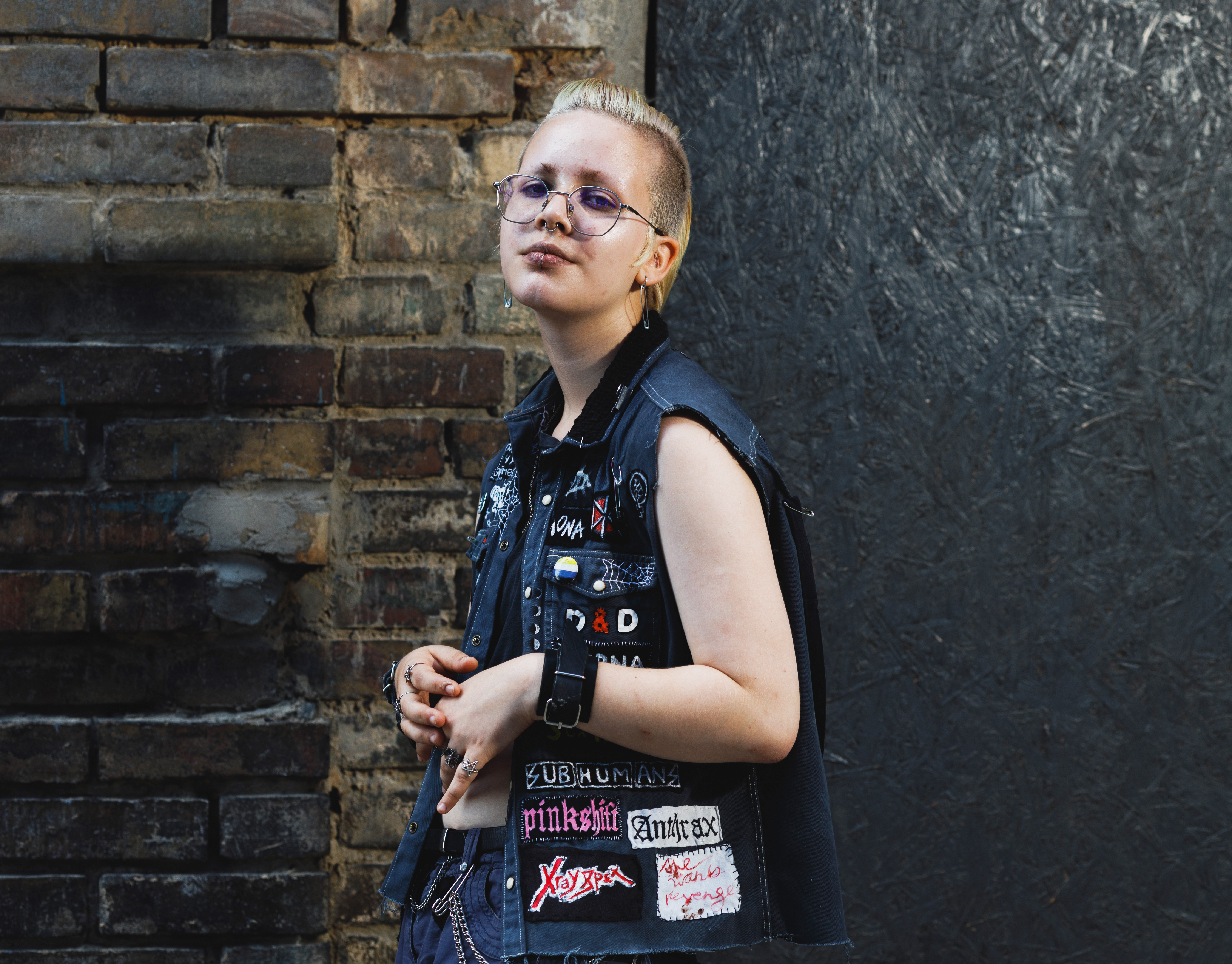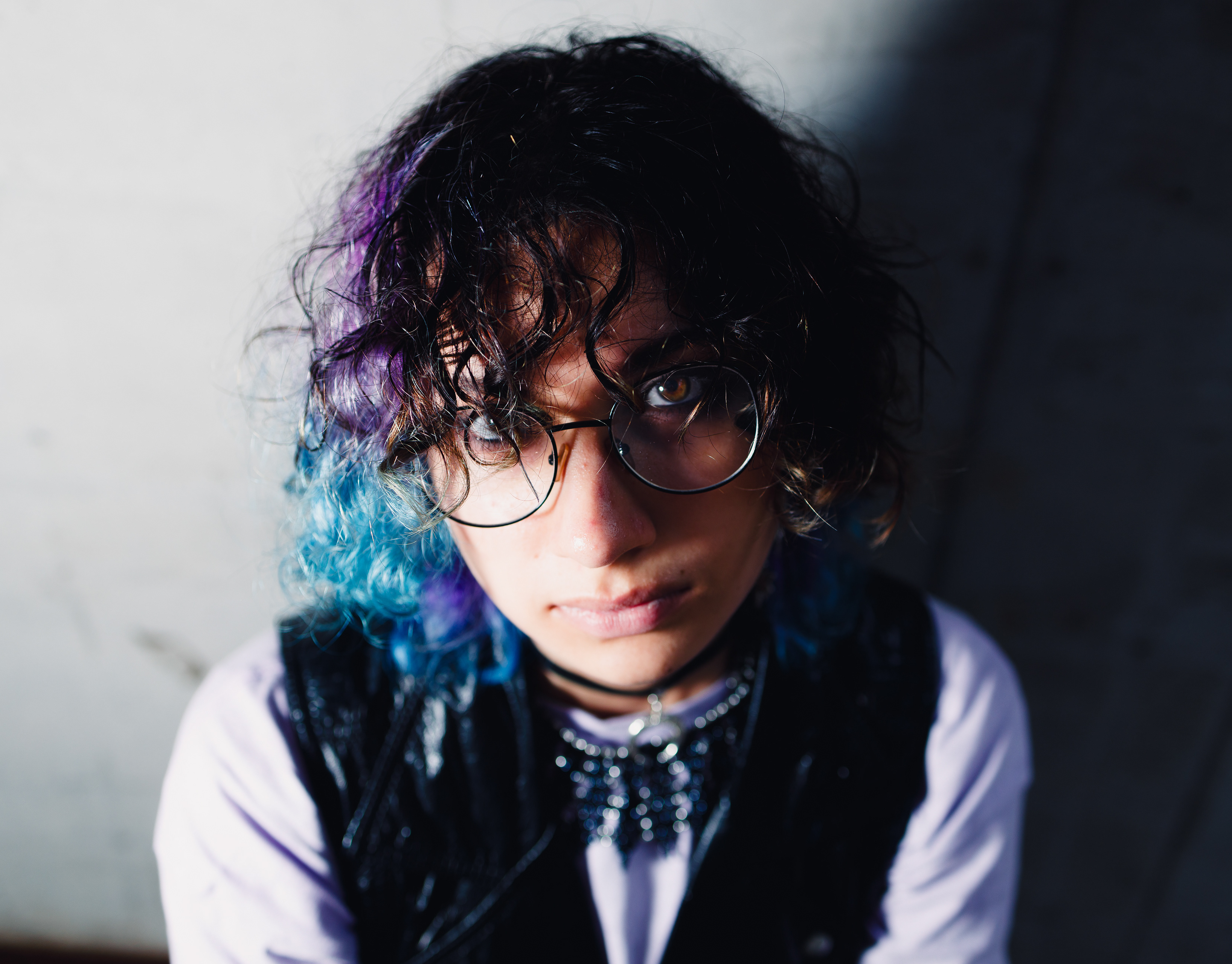Theo poses for a photograph at the Expocenter of Ukraine, Kyiv, August 1, 2024.
“I don’t want to be tied to the binary system. I see myself as an abstract being, not bound to anything fixed,” they said. Photo by Artem Baidala.
Tell me about your first realizations regarding your gender identity.
— It started in childhood. I remember being in the bathroom in front of the mirror, crying because I didn’t understand why I was a girl if I didn’t feel like one. In kindergarten, I was more interested in building blocks and toy cars — and I’m grateful they bought me those, rather than “girly things,” though that did happen sometimes. Over time, my family understood which toys didn’t suit me. But even then, I couldn’t understand why I wasn’t interested in playing games that were supposed to be for girls, even though I seemed like one of them.
Were there moments in adulthood that helped you understand yourself better?
— Yes, the turning point came in college. My only friend at the time was a trans guy. He introduced me to the concept of gender and nonbinarity. This sparked some internal insights, and memories from childhood began to make sense. I started experimenting with labels, trying on different identities. Eventually, I arrived at nonbinarity as the most understandable and fitting umbrella for me.
How do your close ones feel about your identity?
— It’s complicated. My mom initially reacted critically, even cried when I asked her to use the name Theo and male pronouns. The family still doesn’t take it seriously, calling it “nonsense”. But thanks to my nephews, they’ve gotten used to my name. My university friends and colleagues accept me well.
Why male pronouns specifically? What’s important to you about their use?
— The pronouns “he/him” are the most comfortable for me. It’s not a choice, but more of a “fit”. I tried others: “it/its” seemed interesting, but society isn’t ready for that; it’s seen as too strange. “They/them” works, but it evokes a sense of plurality, which isn’t me. And “she/her” feels completely wrong — it’s not how I feel.
“I started experimenting with labels, trying on different identities. Eventually, I arrived at nonbinarity as the most fitting umbrella for me,” says Theo.
How do your close ones feel about your identity?
— It’s complicated. My mom initially reacted critically, even cried when I asked her to use the name Theo and male pronouns. The family still doesn’t take it seriously, calling it “nonsense”. But thanks to my nephews, they’ve gotten used to my name. My university friends and colleagues accept me well.
Why male pronouns specifically? What’s important to you about their use?
— The pronouns “he/him” are the most comfortable for me. It’s not a choice, but more of a “fit”. I tried others: “it/its” seemed interesting, but society isn’t ready for that; it’s seen as too strange. “They/them” works, but it evokes a sense of plurality, which isn’t me. And “she/her” feels completely wrong — it’s not how I feel.
How do you deal with negative reactions from society?
— It’s hard for me to step outside of my “bubble”. It feels safer here. Although I understand that society won’t change on its own if attention isn’t drawn to these issues. I’m lucky with my environment — many people treat me with respect, even asking about my pronouns, for example, at one of my previous jobs. It’s important to see nonbinary people in different spheres.
“He/him isn’t a choice — it’s a fit,” Theo explains.
Do you feel a connection between your neurodivergence and your gender identity?
— Yes, I believe they are strongly connected. People with autism often find it difficult to identify themselves within rigid social frameworks. I don’t want to be tied to the binary system of “male/female”. It’s just not me. I rather see myself as an abstract being, not attached to anything fixed.
What, in your opinion, would help society better understand nonbinarity?
— I believe we need to explore and not limit ourselves to what’s familiar. We often accept the binary system because it’s easy to understand, but this blocks the development of thinking. If a person believes they are worthy of respect and are ready to show it, this topic will interest them.
How do you see your future?
— I won’t change, no matter how “strange” it may seem to someone. But I hope I can continue exploring myself and remain in harmony with the world.
Interview conducted with Theo on June 7, 2024.







